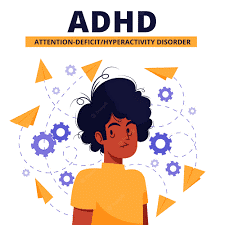ADHD in Children
Introduction
One of
the most prevalent mental illnesses among children is attention deficit
hyperactivity disorder or ADHD. The term "ADHD" describes a set of
behavioral symptoms, such as impulsivity,
hyperactivity, and inattention. Children
with ADHD may find it difficult to succeed in school as a result of these
symptoms, which may also cause problems in their social interactions.
Although
the precise origins of ADHD are still unknown, evidence points to a significant
hereditary component. A child's chances of receiving an ADHD diagnosis are
higher if they have a close family member with the disorder. Studies on brain
imaging have revealed structural and functional variations in certain brain
regions in children with ADHD. ADHD symptoms may also arise from environmental
causes such as low birth weight, alcohol or drug exposure during pregnancy, or
both.
Typically, ADHD symptoms first manifest in early infancy, most commonly between the ages of three and six. But only when a child reaches the age of six, when their emotional and mental development is more advanced, can a diagnosis be deemed official.
ADHD types
Mainly inattentive, mainly hyperactive-impulsive, and combination presentations are the three basic forms of ADHD presentations.
• Predominantly Inattentive Presentation:
Children who exhibit this type struggle to keep organized, follow directions, pay attention to details, and finish projects. They are prone to forgetfulness and distraction.
• Hyperactive-Impulsive Presentation:
These kids have trouble staying motionless. They frequently get up at inopportune times and fidget or wriggle in their seats all the time. Because of their impulsivity, they frequently interrupt people, act without thinking, and have trouble adhering to regulations.
• Combined Presentation:
This is
the most prevalent kind, exhibiting signs of both hyperactivity-impulsivity and
inattention.
Diagnosis of ADHD
A kid must exhibit at least six signs of inattention and/or hyperactivity-impulsivity for at least six months in order to be diagnosed with ADHD. These symptoms have to be so bad that they make it difficult for the youngster to function at home, at school, or with friends. Since ADHD behaviors may be more obvious in a classroom context, teachers' input is crucial. Before establishing ADHD, other disorders such as anxiety, learning impairments, abuse, or neglect must be ruled out.
For kids, living with ADHD can be difficult. They could find it difficult to sit still during classes, pay attention in class, follow multi-step directions, retain knowledge, turn in assignments on time, and maintain organization. If not properly controlled, hyperactivity or fidgeting might lead to social problems. Long-term play may be challenging. Youngsters may behave impulsively and struggle to wait their turn or adhere to game rules.
ADHD has a detrimental effect on a child's academic performance in terms of grades, test scores, and general school performance. Being inattentive causes one to overlook important information and ideas covered in class. Both the instructor and other pupils are disrupted by hyperactivity. Careless errors on assignments are a result of impulsivity. Without the right assistance, children with ADHD find it difficult to focus on their homework.
If a youngster exhibits excessive hyperactivity or impulsivity, their classmates may perceive them as bothersome or disruptive. For these children, forming and maintaining friendships is difficult. When faced with obstacles or difficulties, they struggle to take turns in talks, pick up on social signs, and control their emotions. Falling short of peers without ADHD socially or intellectually might lead to low self-esteem.
Children are more likely to experience anxiety, depression, and drug misuse problems if they receive no treatment. When they become older, they often have worse grades, greater school dropout rates, and more driving accidents. Prompt diagnosis and efficient care through a team approach comprising physicians, teachers, parents, and other mental health experts are essential for long-term results.
ADHD treatment
The good news is that kids can develop effective coping mechanisms for ADHD symptoms if their treatment plan is customized to meet their requirements.
For around 70% of youngsters, medication in the form of stimulants or non-stimulants is extremely beneficial.
Medication by itself, though, is typically insufficient. Additionally, behavioral therapies such as cognitive behavioral therapy assist in teaching time management, emotional control, coping strategies, and organizing abilities.
Parent education on routines, praise, and constructive discipline can enable parents to provide their children with greater assistance. Children can effectively manage their hyperactivity; stay focused, and finish homework with the support and allowances provided by their instructors in the classroom.
Children can use extracurricular activities as a productive outlet for their energy. Peer interventions support friendship-making and maintaining abilities. Counseling deals with any new problems related to mental or emotional health. The best long-term results come from a mix of medicine, therapy, lifestyle modifications, and support.
In summary
The primary symptoms of attention deficit hyperactivity disorder (ADHD) include impulsivity, hyperactivity, and inattention. It is a biological condition that frequently runs in families. It can significantly harm a child's social, emotional, and intellectual development if left untreated. However, many kids are able to effectively control their ADHD symptoms and have happy, healthy lives with the right multimodal treatment plan customized to each child's unique needs.
The fundamental elements that will foster your child's success as a parent are your affection, empathy, and support. Seek professional help from TalktoAngel or other experts to make this journey as smooth as possible. They work with highly qualified and experienced ADHD therapists who specialize in treating ADHD.
Never forget that you are not going alone and that your child can excel if given the right direction and information.







Post a Comment